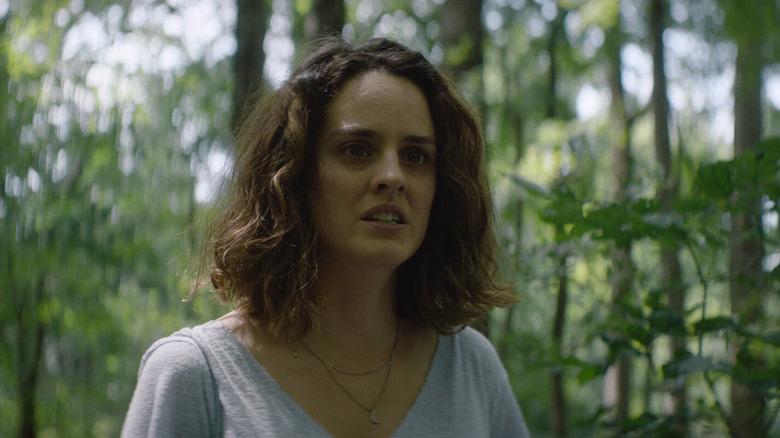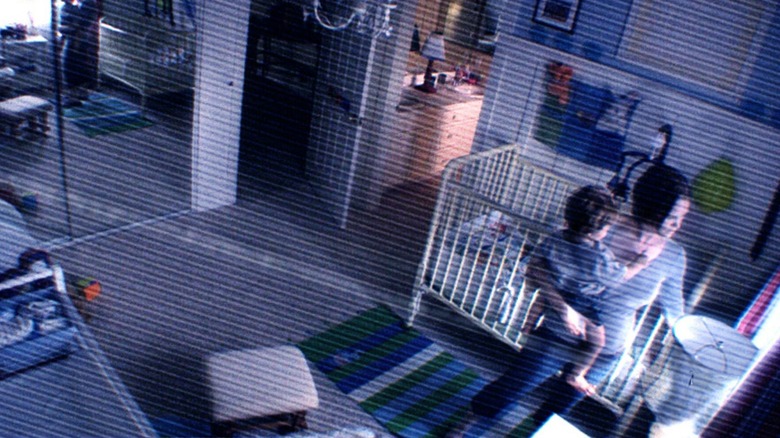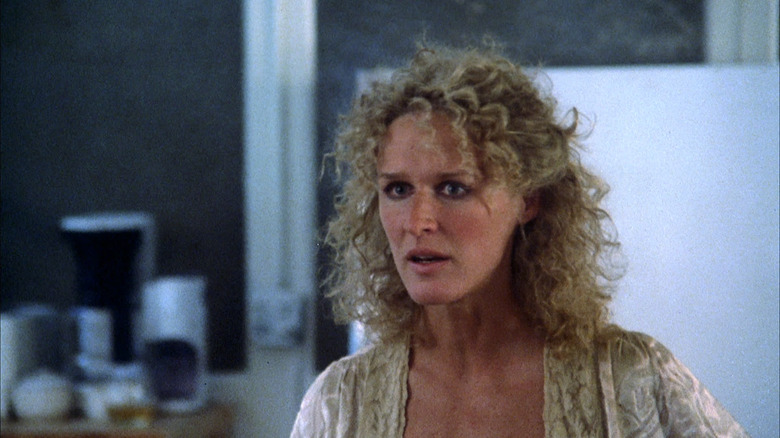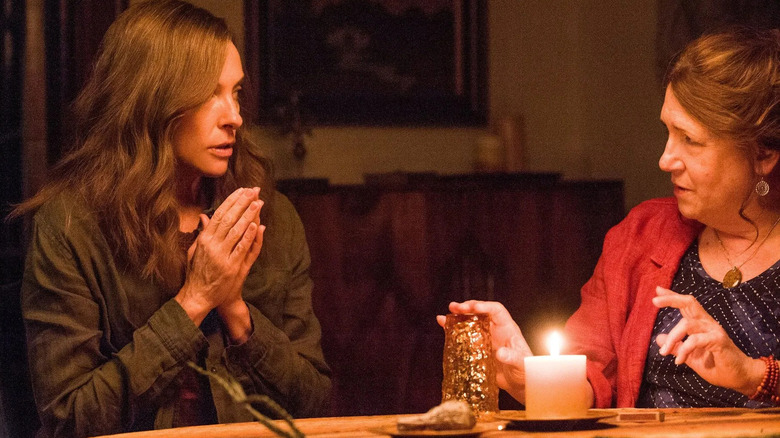Baby Ruby Uses Horror Movie References To Lure In Its Audience
This article discusses difficult subject matter including (but not limited to) postpartum psychosis.
Bess Wohl's timely and powerful "Baby Ruby" opens with the main character Jo (Noémie Merlant) carefully making a banner for her baby shower. Her methodical cutting and placement of the letters demonstrate how much she enjoys being organized and in control, as well as the pressure she feels to curate the perfect life and aesthetic for her website and social media pages. Jo is not just a person or a mother-to-be: she is a brand. After the birth of Ruby, she discovers motherhood is far more difficult than glossy Instagram photos portray it to be.
The entire film is through her point of view as she spirals into a whirlwind of depression, anxiety, and loneliness. She also starts having unsettling hallucinations that turn out to be symptoms of postpartum psychosis. One of the most captivating aspects of "Baby Ruby" is that Jo's paranoid episodes manifest in images and situations that recall famous horror movies. Wohl cleverly uses the familiar horror situations and conventions to immerse the audience in the strange, unstable, and vulnerable time after having a child.
Each horror movie trope taps into very specific and common fears that all mothers have. Wohl's melodramatic and lurid style allows Jo's distress to resonate with moviegoers, especially when the entire film is through her skewed point of view. By using these horror genre references, Wohl confronts viewers with the terrifying realities of first-time motherhood and how life-shattering the adjustment can be. "Baby Ruby" is a bold film that highlights the importance of giving new parents more support during the challenging period of raising a newborn, something evoked by each of the horror films it references.
Paranormal Activity 2
Taking care of babies is difficult, and parents must learn to handle them carefully. There are lots of rules to protect little ones from physical harm: strapping them into their car seats a certain way, making sure the swaddle is not too tight, baby-proofing the entire house, and so on. Since parents are on constant alert over their children's safety, they often have difficulty leaving them for the first time. Mothers especially.
When Jo and her husband Spencer (Kit Harrington) go to dinner at a nice restaurant, she cannot stop checking the baby monitor even though she knows her mother-in-law is watching Ruby. Much to her horror, she discovers that the monitor has fallen over. Then, she hears mysterious chanting and sees the chilling image of a strange woman. These haunting, lo-fi shots from the baby monitor recall "Paranormal Activity 2." The film similarly depicts the terror of mundane domesticity and transforms everyday objects — especially those in an innocent baby's room — into something sinister.
Jo tears through the restaurant and races home only to find that Ruby is safe and sound. "Paranormal Activity 2" and "Baby Ruby" both examine what mothers fear most through portraying extreme, even unbelievable consequences of leaving your child in someone else's care.
Fatal Attraction
New mothers can also deal with postpartum rage. The incessant ringing of Ruby's loud cries is agonizing, making the viewer feel as if they will snap just like Jo. She believes that Ruby's wails are meant to punish her, and that Ruby purposefully bites her breast during feeding. Noémie Merlant's wired performance as Jo conveys her short fuse; her entire body seems to vibrate with exasperation and exhaustion. Jo shouts at her daughter, "I'm not going to let you win."
During another scene, Spencer sees his harried wife at the stove and asks where Ruby is. The camera pans down in a quick, almost comical manner to a boiling pot as if suggesting that, much like the poor bunny in "Fatal Attraction," Ruby is about to become dinner.
In "Fatal Attraction," Glenn Close plays Alex, a woman who has an affair with a married man. She becomes extremely possessive of Dan and furious when he tries to leave her. The thriller paints her as "a monster who deserved her fate" (via The Telegraph). She is killed by Dan's wife for destroying her "perfect" American family. Alex is seen as a threat to the suburban ideal, not a mentally unstable and lonely woman who desperately needs therapeutic support.
"Baby Ruby" subverts "Fatal Attraction" by portraying Jo not as a villain, but as someone who deserves our sympathy. Wohl does not dismiss Jo as hysterical — she's someone whose mental health has been neglected. She provides a more empathetic understanding of Jo's anger. The film recognizes that new mothers often have short fuses and need help managing their heightened emotions.
Hereditary
Jo's fear that a secret cult is going to kidnap Ruby certainly brings to mind "Rosemary's Baby," but the storyline also evokes the dread and suspicion that permeates "Hereditary." Stranger danger is a persistent fear for all parents, especially those who have the responsibility of caring for a child for the first time.
Ruby meets Shelly (Meredith Hagner), an excessively cheery, modern Stepford Wife who refuses to let Jo see her baby in the stroller; "You never wake a sleeping baby," she snaps. Their relationship becomes intense, eventually leading to a hazy night of debauchery that may or may not be real. Shelly is a part of a bigger Mom Club made of sleek, effervescent women who jog with their strollers in creepy synchronization. Their over-the-top friendliness feels sinister, much like the cult in "Hereditary," who appear as everyday people.
Both films illustrate how frightening it is to be surrounded by others with ulterior motives, especially when they present as friendly. The gentle-voiced Joan (Ann Dowd) who pretends to be a stranger from a grief support group in "Hereditary" is just as sweet and approachable as Shelly. The Paimon-worshipers were real in "Hereditary," but in "Baby Ruby" Jo imagines that these ordinary suburban women are a part of a cult that want to steal children for their own. Jo's paranoia reflects typical anxieties that mothers have about interacting with new people and learning to trust them with their children.
If you or someone you know is struggling with postpartum depression or psychosis, there is help available. Contact Postpartum Support International or use their resources to find a provider today.



